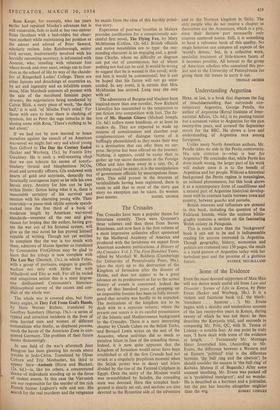The Crusades
THE Crusades have been a popular theme for historians recently. There were Grousset's three volumes and then three from Steven Runciman, and now here is the first volume of a most impressive collective effort sponsored by the MediEeval Academy of America and produced with the lavishness we expect from American academic publications. A History of the Crusades. Vol. I. The First Hundred Years, edited by Marshall W. Baldwin (Cumberlege for University of Pennsylvania Press, 96s.), takes the story up to the destruction of the Kingdom of Jerusalem after the disaster of Hattin, and does not appear to be a great advance on its predecessors as far as the actual history of events is concerned. Indeed the story of that hundred years of propping up an impossible frontier has been so fully investi- gated that novelty was hardly to be expected. The institutions of the kingdom are to be dealt with in a separate volume; where the present one scores is in its careful presentation of the Islamic and Mediterranean background to the Crusades. There is a most interesting chapter by Claude Cahen on the Seljuk Turks, and Bernard Lewis writes on the sect of the Assassins, whose activities did so much to paralyse Islam in face of the crusading threat. Indeed, it is now quite apparent that the Kingdom of Jerusalem would never have been established at all if the first Crusade had not struck at a singularly propitious moment when the Seljuk power was in decay and Islam divided by the rise of the Fatimid Caliphate in Egypt. Once the unity of the Moslem world was re-established by Saladin, the crusading state was doomed. Here this complex back- ground is clearly set out, and sections are also devoted to the Byzantine side of the adventure
and to the Norman kingdom in Sicily. The only people who do not receive a chapter to themselves are the Armenians, which is a pity, since their decisive part necessarily only receives scattered notice. Still, it is something to have a reference book of this quality. No single historian can compass all aspects of the 'world's debate,' but, in a collective work, specialist treatment of little-known facets of it becomes possible. All honotir to the group of American scholars who conceived this pro- ject and to the University of Pennsylvania for giving them the means to carry it out. THOMAS ARCHER


































 Previous page
Previous page